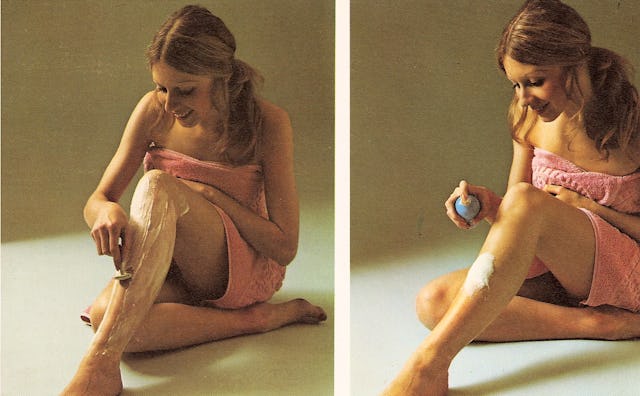Yes, 11-Year-Old Girls Are Too Young to Shave Their Legs

Dear Prudence, Slate’s usually spot-on advice column, recently ran a letter from a mom whose 11-year-old wants to start shaving her legs. The question:
“I’m the proud single mom to an 11-year-old girl, who has recently started asking to be allowed to shave her legs. Personally I can’t remember when I started shaving my legs, nor does my mother remember when she started. Do you know when the proper time is for a girl to start?”
And Emily Yoffe, who writes the Dear Prudence column, replies:
“The proper time is when your daughter feels self-conscious about not shaving. She does sound young at 11 years old, but this is strictly an individual matter. She may be rapidly heading toward full-blown puberty and she is uncomfortable about the dark hair on her legs. It could also be that her friends have started shaving and she wants to feel grown up like them, even if it means removing some peach fuzz. The next time you shave your legs, get your daughter her own razor and have a mother-daughter depilation session, while you give her some tips on avoiding nicks.”
Okay, one doesn’t read Dear Prudence for advice on raising a feminist daughter. But blithely suggesting a “mother-daughter depilation session” seems just a tad retro—how about mother-daughter girdle shopping, or a mother-daughter study session of The Rules?
“To shave or not to shave, yes or no?” is about an eighth of the story here. Parents today don’t hesitate to point out gender-based inequities in other areas: They wouldn’t think twice about saying, “Yes, girls can be engineers,” or, “No, not all girls are into pink dresses and Barbies.” But for some reason beauty standards for women and girls don’t get the same scrutiny as other double standards. Perhaps because initiating girls into beauty rituals is framed as fun and relaxing, like spa days for children. Or perhaps because our ideal of “beautiful”—smooth legs, sleek hair, slim bodies—is also entwined with the imperative that beauty be effortless. Any suggestion to the contrary—that these efforts take money and time—would brand a woman as vain or high-maintenance. It’s a neat trick.
But it is worth pointing out, to a young girl, that shaving will take a chunk of time out of her week, and it will cost a certain amount of money that the beauty industry will gladly take for the rest of her life. (Gillette Australia has a page devoted to depilating your tween, complete with instructions for how to demonstrate shaving to a child: “Just show her.”)
Girls should know, from an early age, that media and marketers will invent problems with the female body—vaginal odor, a not-perfectly-flat mons pubis—that the girls will have to buy a product or undergo surgery to correct. They should know that these invented body flaws are designed to unsettle a younger and younger market: We can surmise that Gillette would coin Hairy Toddler Syndrome if they could get away with it, and sell you a razor to solve the problem: “My First Years Twin-Blade, specially formulated to glide around even the chubbiest of knees.”
She probably should know that if, down the road, she wants laser hair removal, she can spend the equivalent of a graduate degree to have it done by an M.D., or she can go to some back-alley charlatan wielding a light saber hot-wired to a space heater. Enjoy those long, striped burns down your legs!
The girl in the Dear Prudence question should probably at least know that once you start shaving, it’s difficult to stop. And maybe that she may find herself, on the evening of her Carnegie Hall debut, balanced like a stork in the shower, frantically scraping at her shins, while her male colleagues are reading or playing Candy Crush or whatever it is that men do with their extra time. When she’s running for president, she might find herself with a half-hour less per day to bone up on jobs numbers than the male candidate.
Okay, maybe this is too much for an 11-year-old. I’m not saying that mothers should forbid their daughters to shave or wear makeup. It’s one thing to recognize there’s a double standard and another to insist that your child buck it all by herself. Kids have to negotiate their social milieu as best they can, and for some girls that may mean conforming to what the other girls are doing.
But it is worth pointing out, at a minimum, that this isn’t something boys are expected to do. To not even talk about the double standard—a standard that will eat up her time and drain her wallet, for the rest of her life—seems like a dereliction of duty. It’s part of an ongoing conversation that parents should be having with their daughters and their sons. I’m surprised that Prudence didn’t address it.
This article was originally published on